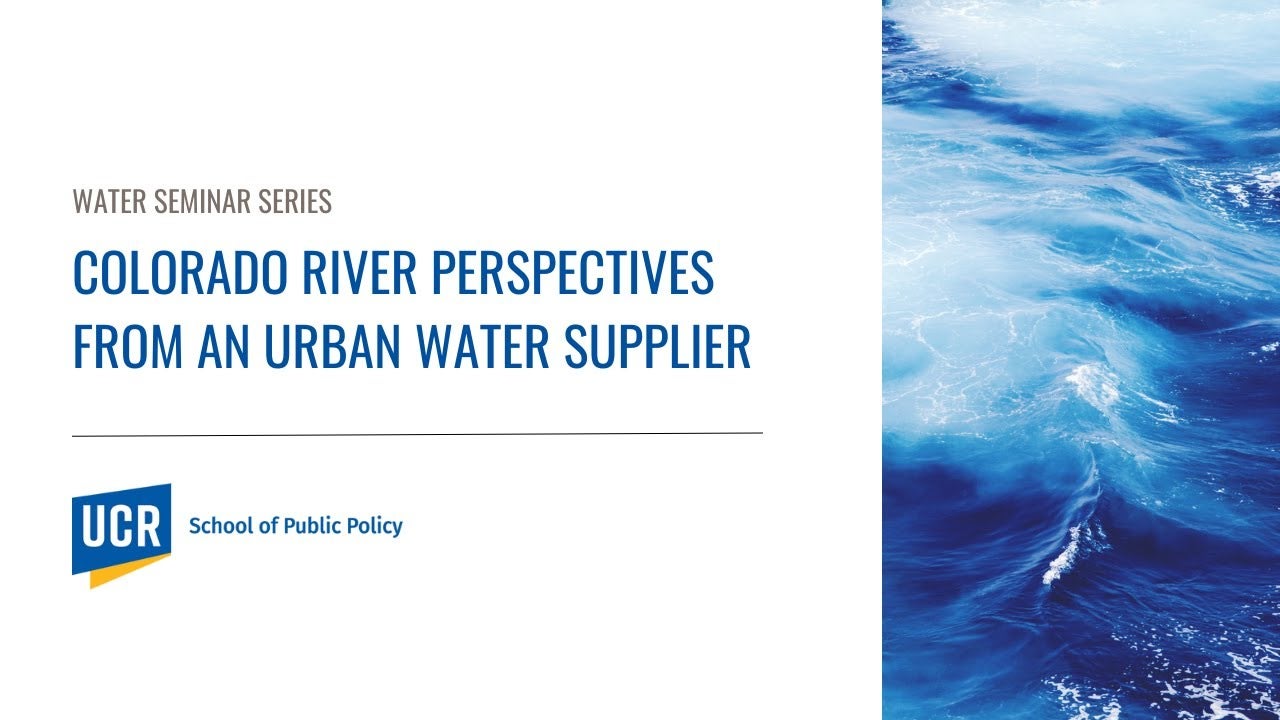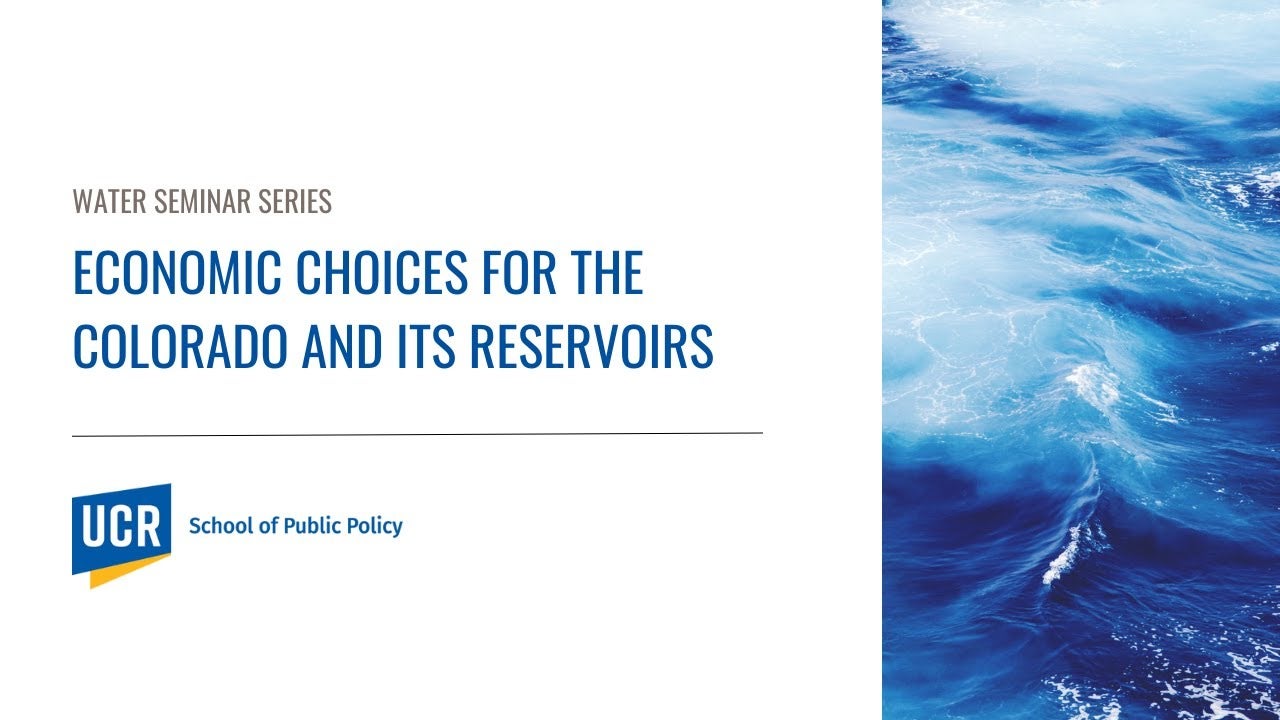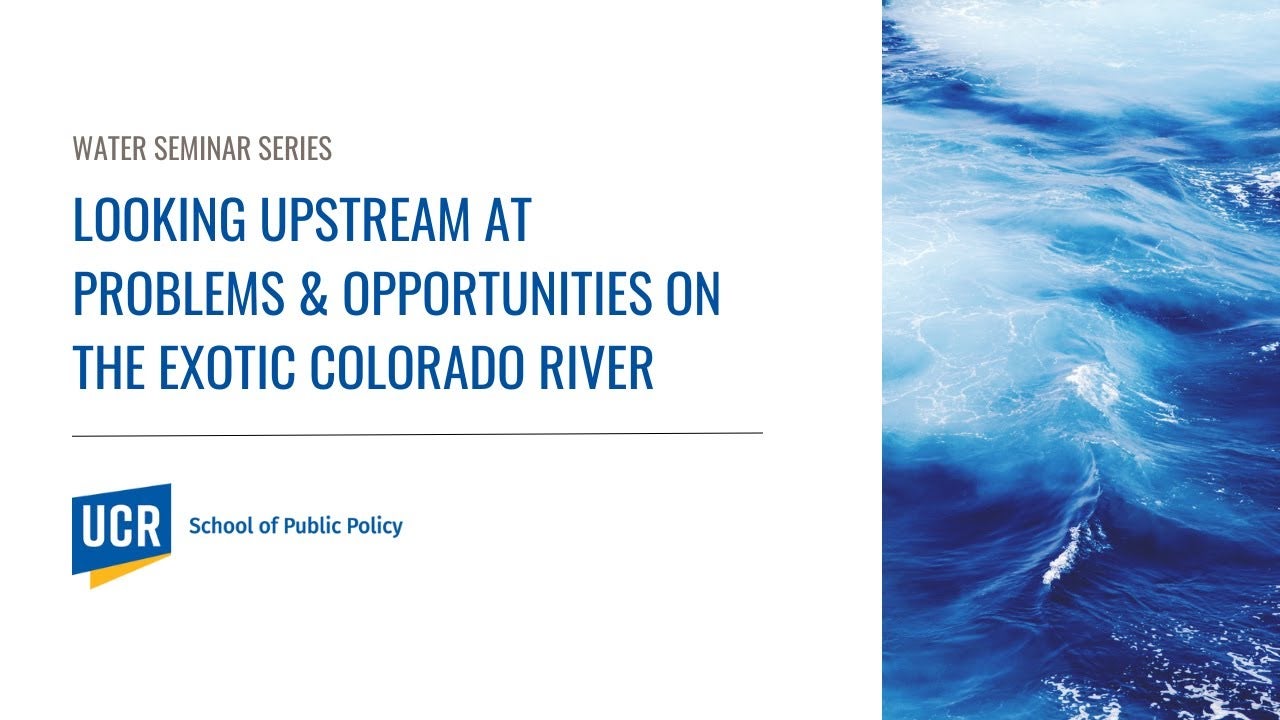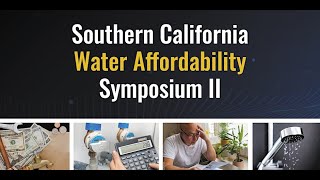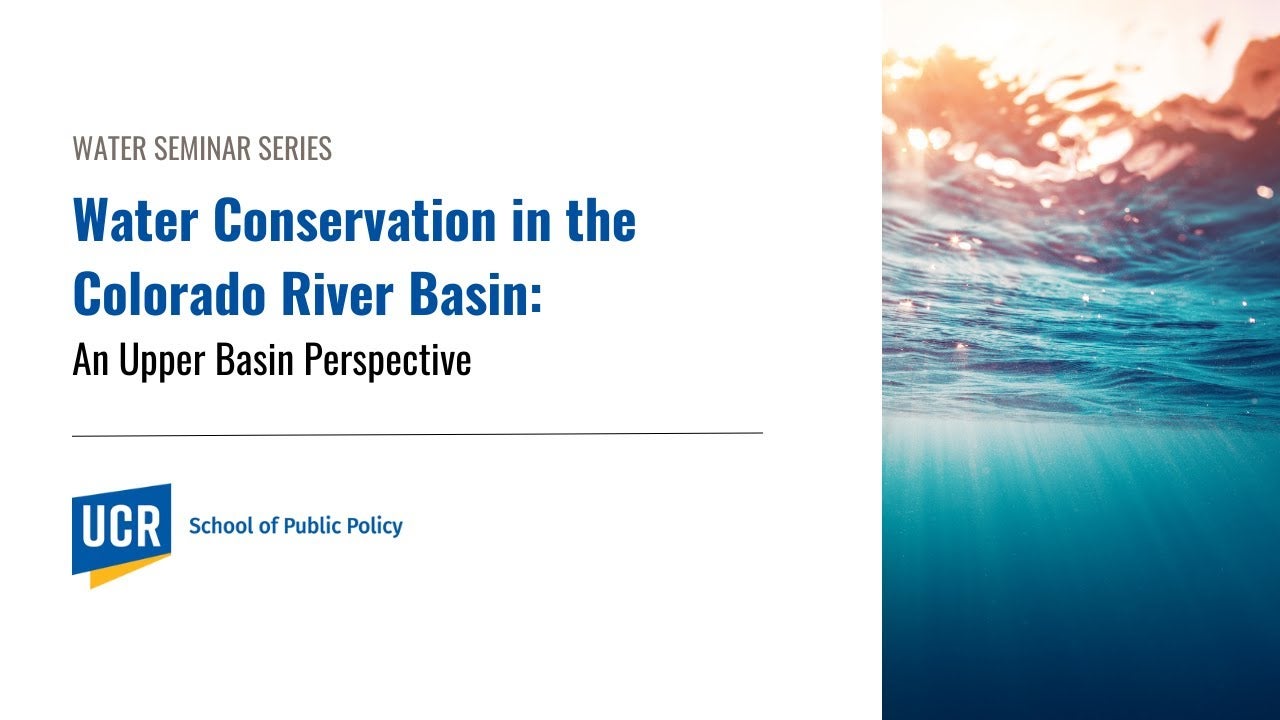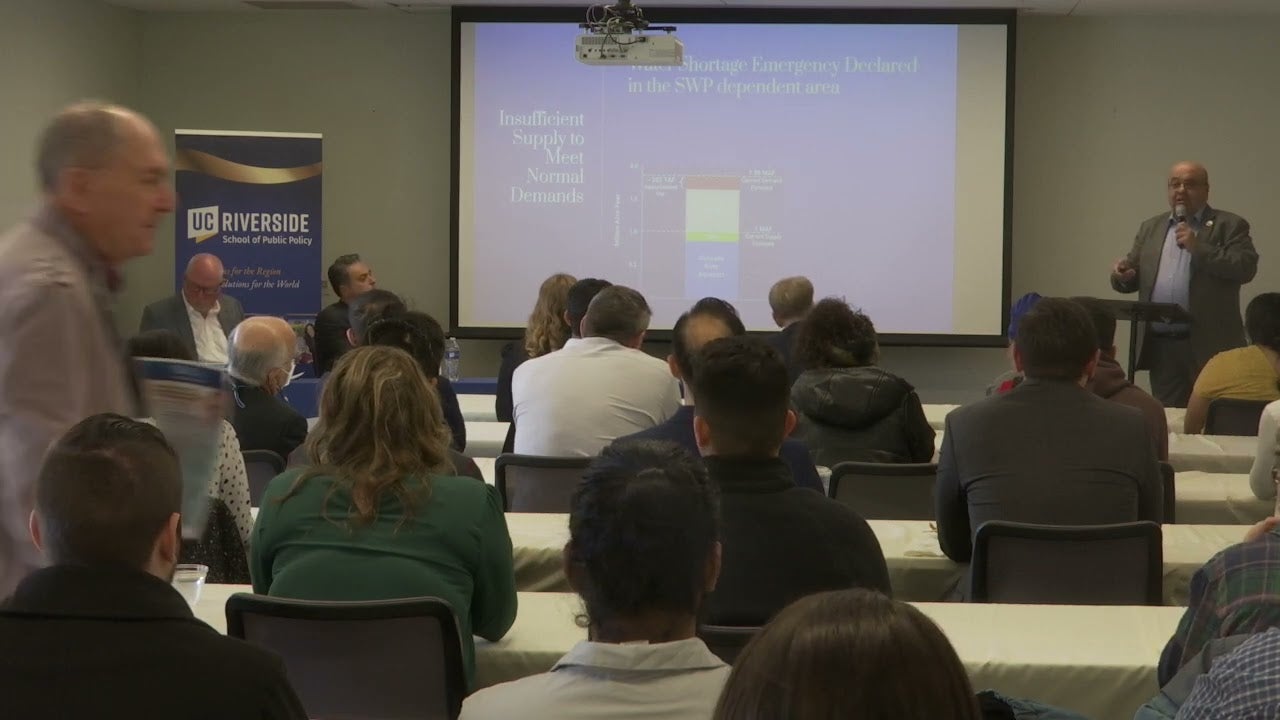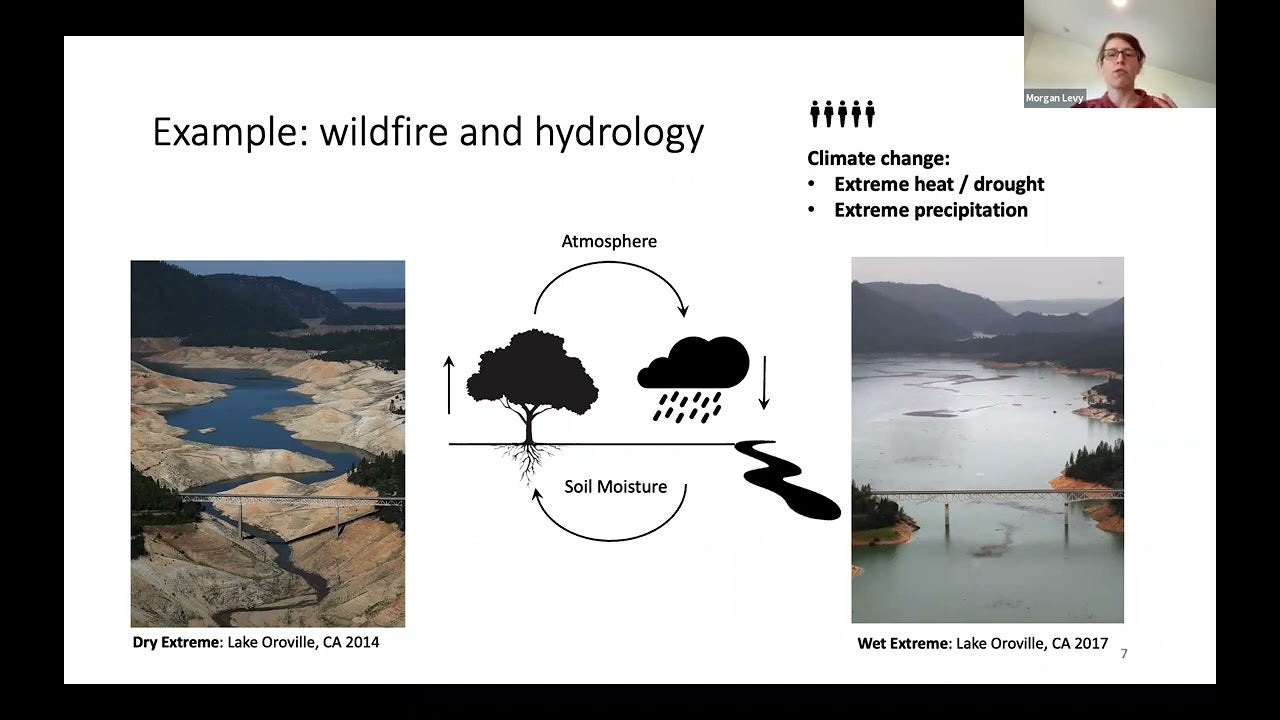
Water Seminar Series
Water Dialogue Seminar Series
Our seminar series features speakers from across the globe, including leading academics, water managers, and policymakers. The goal of the series is to raise public awareness about water-related challenges and highlight innovative solutions being implemented across the U.S. and internationally.
By including participation from water agencies, the series also fosters long-term collaboration between researchers, practitioners, and decision-makers working to address shared water issues.
The series includes eight seminars annually:
-
Three in Fall Quarter
-
Three in Winter Quarter
-
Two in Spring Quarter
This schedule provides one seminar per month from October through May. All events are free and open to the public.
If you are interested in presenting, please contact us at mehdin@ucr.edu.
👉 Check out our past seminars below to see the range of topics and speakers we've hosted.
-
Winter 2024
Drinking water system consolidation potential, governance and equity implications in California - January 31, 2024
UCLA Luskin Center for Innovation, Department of Urban Planning and UCLA Water Resources Group
This talk focuses on the author and collaborators’ published research which explores answers to several related questions regarding drinking water system consolidation, a policy that has grown in favor in recent years a means to enhance water equity in the United States. First, the motivation and potential for drinking water drinking water system is outlined, using examples from Los Angeles as well as New York. Second, we present results on a comprehensive analysis of the prevalence and governance pathways of drinking water system consolidations in California over the period 2015-2021. We find empirical support for certain, but not all common, theoretical claims about consolidation in the literature. Third, using this same dataset, we analyze the populations involved and equity outcomes achieved. We find that residents served by consolidating and receiving systems tend to be similar but among consolidated systems, low-resource communities are underrepresented. We close with implications for future research, policy and advocacy on drinking water system consolidation.
-
Fall 2023
Crisis or Cooperation? Colorado River perspectives from an urban water supplier - December 6, 2023
Chief of Water Resources for the Metropolitan Water District of Southern California
The Metropolitan Water District of Southern California sees the Colorado River from dueling perspectives: senior priority water rights amongst the basin states but junior priority within California. This juxtaposition drove innovation and cooperation on the river for decades. Will a changing climate spur further cooperation or conflict? This presentation will explore how a large urban water supplier can contribute to solutions.
Economic Choices for the Colorado and its Reservoirs - November 15, 2023
Professor of Economics at Siena College
Intense competition over use of Colorado River Basin water resources has been a reality for over a century. With ever increasing demands and the prospect of diminishing flows, questions of allocation across different sectors and political divisions, and across time, become more economically consequential with each passing year. While the past quarter century has brought substantial institutional adaptation to address these challenges, many opportunities to improve outcomes remain. In this seminar I cover my recent work on future reservoir levels and available surface water supplies. I then summarize a variety of traditional and innovative approaches for managing allocation between the competing users of rival and nonrival Basin water resources. I conclude with a qualitative assessment of the differing economic consequences of the choices which lie ahead.
Looking Upstream at Problems & Opportunities on the Exotic Colorado River - October 18, 2023
Executive Director of the Utah Rivers Council
Research and Policy Analyst at the Utah Rivers Council
The headwater snowpacks of the Colorado River in Utah, Colorado and Wyoming have shrunk 20% in the last two decades in the face of climate change, with the region’s aridification likely to get even worse in years to come. Home to 40 million people, the Colorado River Basin’s water problems have attracted global attention, which has created constituent pressure on decision makers to address longstanding policy paradigms conceived with inherent problems that were never intended to function in a drier world. Newspaper headlines over the last year have heralded multiple new agreements which claim to dramatically reduce water use in the Colorado River Basin to grapple with historic low water levels in Lake Mead and Lake Powell, America’s two largest reservoirs. Are these announcements really enough to weather our drier world and what other challenges and potential opportunities wait upstream for the millions of people who live near the terminus of the Colorado River and rely on its flows? Join us for a conversation about the challenges that aridification and entrenched governance pose to future generations of the Colorado River Basin, and the opportunities that have thus far been largely left out of the public dialogue.
-
Spring 2023
Southern California Water Affordability Symposium II - May 18, 2023
Moderator:
Celeste Cantu Chair, SDRWQCB
Greg Thomas General Manager, Elsinore Valley MWD
Mike Gow General Manager, Lake Hemet MWD
Monica Santana MA, CCAP, Community Action Partnership of Riverside County
Kyle Jones Policy and Legal Director, Community Water Center
Since our 2019 Symposium, Southern California has experienced unprecedented affordability and water system challenges. Join us for a series of panels presentations and discussions on water affordability challenges and possible solutions in the region by researchers, water providers/policy makers, and community-based organizations.
00:00 - Welcome by Dr. Kurt Schwabe
04:58 - Keynote Speaker Dorene D'Adamo (Vice Chair, CA State Water Resources Control Board) Affordability Research Panel: What Do the Numbers Say?
32:25 - Water Affordability: Local, Regional, and Statewide Evidence by Dr. Mehdi Nemati
48:44 - Water Quality Issues and Affordability by Dr. Maura Allaire
1:03:02 - Housing Affordability by Dr. Stan Oklobdzija
1:14:56 - Panel Discussion
1:33:16 - Q&A with Director Adán Ortega (Chairman, Metropolitan Water District of Southern California)
2:04:33 - Experiences, Challenges, and Perspectives Panel
-
Winter 2023
Water Conservation in the Colorado River Basin: An Upper Basin Perspective - February 23, 2023
The Colorado River Basin has been experiencing persistently dry hydrology for over two decades, with policymakers across the basin proactively seeking ways to stretch existing water supplies to meet demands. This presentation shares an Upper Basin perspective on water conservation efforts in the region with a particular focus on the tradeoffs associated with implementing Demand Management, a program that would support the voluntary, compensated, and temporary reduction of consumptive water uses in the Upper Basin and help assure the Upper Basin’s continued compliance with the 1922 Colorado River Compact. In evaluating tradeoffs, policymakers, water users, and other stakeholders in the Upper Basin must consider the economic and social impacts to local and state communities resulting from water conservation. The presenter describes economic impacts of Demand Management and current research efforts to expand available scientific information, and the role this information can play in assisting policymakers, water users, and other stakeholders in the Upper Basin make informed decisions to resolve the crisis.
-
Fall 2022
One Water Solutions to Western Water Challenges: Creating a Resilient and Reliable Water Future in the Face of Climate Change - December 6, 2022
General Manager, Metropolitan Water District of Southern California
General Manager, Eastern Municipal Water District
Director, Metropolitan Water District and Eastern MWD
One Water Solutions to Western Water Challenges: Creating a Resilient and Reliable Water Future in the Face of Climate Change
Interdisciplinary and data-driven approaches to understanding hydroclimatic change - November 15, 2022
UC San Diego, Scripps Institution of Oceanography and the School of Global Policy and Strategy
Interactions between humans and water are mediated by complex social and physical dynamics. Thus, studying physical water systems in isolation is often not possible, and analysis of coupled systems can be challenging. For example, anthropogenic activities complicate the use of many traditional hydrologic modeling approaches by introducing non-stationarity and feedbacks. Considering this challenge, and the increased availability of spatiotemporal datasets, this talk will highlight the use of data-driven frameworks to understand interactions between geophysical water processes and human water use at multiple scales. Specifically, this talk will explore the impacts of hydroclimatic variability on inland and coastal surface water and groundwater availability in California. This research underscores the complexity and promise of using data-driven approaches to advance sustainable freshwater management and climate change adaptation.
Making the Case for Conservation of Northern Australian Rivers - September 14, 2022
Jeffrey Conner
The University of South Australia, School of BusinessRiver systems in the North of Australia are still mostly unregulated and experience less water extraction than from southern basins such as the Murray Darling Basin. They are conceptualized as sentient beings to whom Aboriginal Australian belong to, in contrast to a colonial conceptualization of people owning water rights. Historically flow patterns in these basins’ have provided the basis for ecosystem service values and a unique 40,000 year living cultural continuity. Dr. Connor will present a case against extraction from these rivers using reference class assessment to temper optimism bias in pre-feasibility studies for regional water infrastructure proposals. We conclude that most irrigation development proposals in the region are unlikely to achieve stated impact objectives for intended beneficiaries and produce poor or negative returns on public investment.
Dr. Connor will then present a case for alternative pathways to northern development without extraction focusing on the significant opportunity costs that result from changing extraction and a range of alternative investment possibilities that don’t require extraction and have better prospects to achieve benefits for targeted beneficiaries consistently with Aboriginal cultural identity and aspirations. -
Spring 2022
California's Water Priorities: Groundwater - May 3, 2022
Andrew Ayres
Research Fellow at Public Policy Institute of California (PPIC) Water Policy CenterThis presentation will provide an overview of current priorities in California’s water policy. Then, it will more closely address ongoing groundwater management challenges. In particular, markets for water in California support drought resilience, environmental improvements, and adaptation to the new market and regulatory conditions. In the coming decades, their effectiveness will be tested to ease the
implementation of the state’s new groundwater law: The Sustainable Groundwater Management Act. This policy requires that local groundwater users form management agencies and bring their groundwater basins into balance by the 2040s; as they face a future of pumping reductions and subsequent land fallowing, water banking and water trading may prove important tools to help manage this transition.
However, a combination of aging infrastructure and complex, conflicting regulatory structures currently hinders the expansion of banking and trading. We will discuss these barriers and what improvements may be possible. -
Winter 2022
The Bipartisan Infrastructure Bill: What Drinking Water Utilities Need to Know - January 26, 2022
Tommy Holmes
Legislative Director, American Water Works AssociationCongress passed and President Biden signed into law in November the Bipartisan Infrastructure Bill, also known as the Infrastructure Investment and Jobs Act, or H.R. 3684. This legislation is poised to provide significant levels of new funding to improve or replace portions of our nation’s water infrastructure. A key feature in this is appropriations of $15 billion over five years to replace lead service lines. However, now that the bill has passed, the real challenge is in implementing this legislation.
-
Fall 2021
The Role of Science and Policy: Drinking Water Safely After Fires - October 20, 2021
Andrew J. Whelton
Professor of Civil, Environmental, and Ecological Engineering, Purdue UniversityDrinking water infrastructure is critical for the health, safety, and economic prosperity of communities nationwide. Extensive and repeated wildfire damage to American and Canadian drinking water systems has exposed gaps in knowledge about infrastructure safety. Recent wildfires have revealed that buried drinking distribution systems and plumbing contamination are poorly understood as well as they, themselves, become the generators of contamination. Firsthand experiences and results of recent studies regarding drinking water infrastructure contamination and decontamination will be shared. The role of plastics and community needs will also be discussed.
Tribal Water Dialogues in Arizona and the Colorado River Basin: Listen, Learn, and Listen - November 16, 2021
Sharon B. Megdal
Director, University of Arizona Water Resources Research CenterIncreased recognition of the importance of tribal water rights, practices, and challenges is leading to greater collaboration with tribal representatives in state and regional water management dialogues and studies. Consultation practices have evolved in Arizona and the Colorado River Basin over the past decade. Initiatives discussed will include: basin-wide study of Colorado River water supply and demand; development of Arizona’s implementation plan for the Lower Colorado River Drought Contingency Plan; processes related to the development of successor regulations to the December 2007 “Colorado River Interim Guidelines for Lower Basin Shortages and the Coordinated Operations for Lake Powell and Lake Mead;” and efforts of the Water & Tribes Initiative|Colorado River Basin, especially Universal Access to Clean Water. On the engagement front, the presenter will draw upon personal experiences and lessons learned from delivering two conferences focusing on Indigenous water and serving on the Board of Directors of the Central Arizona Project.
Freshwater Use by Terrorists, Separatists Groups, and Other Non-State Actors as a Weapon, Tool, and Target: General Assessment of Events and the South Asia Case - December 2, 2021
Tamanna Ashraf and Shlomi Dinar
Steven J. Green School of International and Public Affairs, Florida International UniversityFreshwater has been studied at the inter-state level to analyze how states conflict, cooperate, and negotiate over this strategic and often shared natural resource. Yet, freshwater has also been used by terrorist groups, separatist groups, and other non-state actors as a weapon, tool, target, and a means for control. Using the Global Terrorism Database (GTD), this paper analyzes this latter and less studied dimension of hydro-politics and begins with a global analysis of water-related events to identify trends and patterns across the globe from 1970 to 2016. Since the South Asia region features the largest number of events compared to other geographical regions for this time period, the paper then turns to South Asia for a more specific analysis.
-
Spring 2021
Fox Canyon Water Market: Lessons Learned in SGMA's First Groundwater Market – May 25, 2021
Executive Director of the Center for Economic Research & Forecasting and Assistant Professor of Economics at California Lutheran University
A groundwater market is a promising tool for basins implementing California’s Sustainable Groundwater Management Act (SGMA). While the benefits of a cap- and-trade system for both groundwater users and regulators are potentially very large, so too are the risks. Creating a functioning market is not easy. The most important – and difficult – elements to get right are the rules and structure, which must be tailored to local conditions. Capping and monitoring pumping, generating buy-in from diverse stakeholders and guarding against cheating and adverse impacts are also essential. Since 2015, Matthew Fienup has been in the trenches, developing a groundwater market for three coastal basins in Ventura County, California, an area known as Fox Canyon. This presentation will highlight lessons learned during the design and implementation of the Fox Canyon Groundwater Market, the first market to be implemented under SGMA.
How Much Would it Cost to Meet Florida’s Future Water Demand? Analysis of Proposed Project Options – April 20, 2021
Associate Professor and Extension Specialist,Food and Resource Economics Department, University of Florida
Regional water supply plans developed by Florida’s water management districts (WMDs) identify the need to expand water supplies by 353.97 million gallons per day in the next 20 years. It is expected that water conservation can partially offset the water supply expansion needs. The objective of this study is to estimate the expenditure needed to implement water supply and water conservation projects to meet future demand in the state. To achieve this objective, we utilize a dataset of the completed water projects and proposed future water supply and conservation project options assembled by the Florida Department of Environmental Protection. First, the average costs of developing new water supplies and implementing conservation initiatives are estimated. An econometric model relates the average costs to the project size, type, and WMD region. Secondly, the information about future project options is used to identify water supply sources that can be capable of meeting a large share of the water demand increase in various regions. Finally, combining the average cost estimates with project size and type assumptions, we assess the total expenditure that will be needed to meet the future water demand in Florida. The expenditures associated with ensuring that future water supplies are available to meet the increase in water demands are projected to be $852 million over the 2020 through 2040 planning horizon, with a projected state expenditure of $92.6 million over that period.
-
Winter 2021
Water Demand Forecasting for a Long-Range Water Reliability Plan – March 11, 2021
Senior Water Resources Analyst at Moulton Niguel Water District
The water demand forecasting tool forecasts water demand up to 2050 for Moulton Niguel Water District (MNWD), accounting for both demand increases and reductions attributed to water budget reductions, conservation efforts, water loss, expected changes in weather patterns and demand increases from new development. The model projects various factors that can influence water demand in the long run and estimates demand based on the changing elements. This demand forecasting effort aims to primarily inform the district’s long-range water reliability plan, which ensures an uninterrupted water supply to the district’s customers under usual or unusual scenarios for future years. This tool’s data and predictions are also utilized for reporting documents to the State, including the Urban Water Management Plan. This tool is flexible and has gone through several iterations to adapt to changing conditions and the State’s policies. The district’s planning department utilizes the tool heavily to analyze different scenarios by inputting a different range of factors that can potentially influence the district customers’ water demand in the short and long run.
Water Partnerships between Cities and Farms in Southern California and the San Joaquin Valley – February 17, 2021
Research Fellow, Water Policy Center, Public Policy Institute of California
The San Joaquin Valley and urban Southern California are worlds apart in many ways. Yet each face growing water challenges and a shared interest in ensuring reliable, affordable water supplies to safeguard their people and economies. Increasing climate volatility is heightening concerns about droughts of the future. And two major shifts in California’s water landscape have generated new opportunities for collaboration between urban and agricultural interests. For urban areas, significant declines in water demand have reduced pressure on supplies during normal and wet years for many agencies, making reliability for future droughts the primary concern. For the overdrafted San Joaquin Valley, the requirement to manage groundwater sustainably has heightened interest in expanding water supplies and underground storage. Partnerships between Southern California cities and San Joaquin Valley farms could help alleviate groundwater overdraft in the valley while building drought resilience in Southern California. In this presentation, we will show a variety of solutions that could benefit both regions. For the San Joaquin Valley, we look for ways to augment water supplies to ease the transition to groundwater sustainability, while for Southern California we explore options that would increase cities’ ability to deal effectively with extended droughts.
Trends in California Water Rates and Utility Selection of Pricing – January 19, 2021
Assistant Professor, Department of Urban Planning and Public Policy, University of California, Irvine
Water pricing is a demand management strategy to address the looming challenge of greater water scarcity in arid regions. Much of the literature on residential water rates focuses on evaluating the impact of pricing on household conservation. A separate, but rarely addressed question is what motivates a water utility to select a particular rate structure and the timing of doing so. We assess utilities’ decisions to adopt pro-conservation rate structures, such as increasing block rates and water budget rates. We develop a conceptual model of utility decision-making regarding the transition to pro-conservation rates and apply it to California. We find a notable shift towards pro-conservation rates, which 71 % of California utilities had by 2015, compared to 20% in 1991. We identify two major waves of adoption. The first wave, 1991-1995, experienced the fastest annual adoption rate. Adoption during the second wave, 1997-2015, is associated with peer effects, larger utilities, and greater reliance on purchased water. Overall, this study provides insight into barriers to pro-conservation pricing, which can inform policies to enable transitions and advance conservation goals.
-
Fall 2020
Climate Resiliency and Adaptation Planning – December 15, 2020
Jim Herberg, General Manager
General Manager, Orange County Sanitation District
Orange County Sanitation District (OCSD) operates two treatment plants and fifteen pump stations providing services to 2.6 million people in Orange County. OCSD’s mission is bound to get more challenging as climate change threatens to increase the risk posed by natural hazards to our regional infrastructure. OCSD conducted a Climate Resiliency Study that involved assessing the risks posed by climate change and developing adaptations to mitigate those risks.
Flooding, sea-level rise, wildfire, and extreme heat risks were evaluated using data from California’s 4th Climate Change Assessment.
Water Reuse and Recycling in the West – November 17, 2020
Woolpert Engineering (Tucson, AZ)
The Title XVI program was legislatively initiated in 1992 as a program within the Department of the Interior to provide support in the development of water reuse and recycling in the 17 western United States. Since 2000 the western united states has been in an ever-increasing drought that has significantly reduced the supply of historical surface water transported to distant cities. Water reuse and recycling have emerged as a program that can provide funding to support water development. The cost of recycled water compared to traditional water development approaches is near parity and increasingly will be important to maintaining water security.
The Burdensome Economics and Policy behind the Lake Powell Pipeline – October 20, 2020
Executive Director, Utah Rivers Council
The proposed Lake Powell Pipeline is the largest new water diversion being proposed in the Colorado River Basin that will have reverberations across the water supply of four states. The $3 billion Pipeline will divert 28 billion gallons of water across 140 miles of Southwest desert to provide municipal water to America’s most wasteful urban water users in Washington County, Utah. The seminar explores the perverse economics of the Lake Powell Pipeline and Utah’s defiant ignorance about climate change’s impacts in the Colorado River Basin and what it could mean for future Colorado River Compact negotiations.
-
Spring 2020
Canceled due to COVID-19
-
Winter 2020
Groundwater Pumping Allocations under California’s Sustainable Groundwater Management Act – February 26, 2020
Danile M. Dooley, Ph.D.
New Current Water and Land, LLC
California’s groundwater usage was largely unregulated until the state legislature took up the issue in 2014 and passed the Sustainable Groundwater Management Act (SGMA) in 2014. This seminar will focus on challenges and opportunities with SGMA. In most of the critically overdrafted basins, Groundwater Sustainability Agencies (GSAs) need to set a limit or “cap” (allocation) on the overall amount of groundwater that is removed from the basin. Making pumping allocation decisions has proven to be a very difficult task for GSAs.
Climate Change and the Revealed Comparative Advantage of Water? – January 22, 2020
Charles Regnacq, Ph.D.
Postdoctoral Scholar at Water in the West, Stanford University
The consequence of climate change on the comparative advantages of nations is not obvious and deciphering the impacts of the future alteration of water endowments upon the ability of trade water-intensive products is even more challenging. This presentation tackles this issue by building a worldwide indicator of the water capability to export agricultural products.
-
Fall 2019
Who Gets to Drink? – December 4, 2019
James Salzman, Ph.D.
Donald Bren Distinguished Professor, Bren School of Environment, UCSB, UCLA Law School
The challenge of who gets to drink stretches as far back as the Bible yet is featured in front-page headlines even today. Salzman shows how drinking water highlights the most pressing issues of our time — from globalization and social justice to public health and climate change — and how humans have been wrestling with these problems for centuries.
Environmental Inequities and Water Policy During a Drought – November 13, 2019
Heather E. Campbell, Ph.D.
Professor and Chair, Department of Politics and Government, Claremont Graduate University
Did the CalEPA cutbacks disproportionately affect already burdened communities or those with higher percentages of minorities? Using geographic information systems and spatial regression analysis, we find that the water cutbacks did not, ceteris paribus, further stress already burdened communities.
Sustainable Chino Basin Management – October 16, 2019
Chino Basin Watermaster General Manager
The Sustainable Groundwater Management Act (SGMA) adopted by the California Legislature in 2014 defined the parameters of “good” groundwater management in California. Long before the SGMA passage, forward-looking water managers and engineers in the Chino Basin created the Optimum Basin Management Program (OBMP).
-
Spring 2019
Evaluating Water Conservation Policy in California – April 17, 2019
Dr. Leah Stokes, Ph.D.
Department of Political Science, University of California Santa Barbara
Between 2014 and 2016, California required urban water districts to conserve 20-25% of the water used across the state in 2013. While some districts were very successful, others failed to meet their targets. What explains variation in California urban water districts’ success when state-wide mandatory water reductions were in effect?
Thinking About Water Markets – May 7, 2019
Dr. Michael Hanemann, Ph.D.
Julie A. Wrigley Chair in Sustainability, School of Sustainability, Arizona State University
Economists tend to make assumptions about water markets and transaction costs associated with water markets that, in fact, are unfounded. Rather than seeing markets through the lens of transactions costs, a more relevant approach is in terms of animosities and underlying opposition of interests, vacuums of political leadership, and bargaining failures in what are essentially cooperative games.
-
Winter 2019
Impacts of Reducing Water Collection Times in Rural Kenya – March 4, 2019
Joseph Cook, Ph.D.
Professor, School of Economic Sciences, Washington State University
This seminar examines the impact that water collection has on the time allocation patterns and emotional wellbeing of households in rural Kenya. We exogenously reduced water collection times for a randomly chosen subset of 225 households by having water vendors deliver water to their door each day over 4 weeks.
Evidence-Based Policy Analysis – February 5, 2019
Dale Whittington, Ph.D.
University of North Carolina at Chapel Hill
Numerous randomized control trials have been conducted to estimate the effects of “Community-Led Total Sanitation” on a range of outcomes. However, no benefit-cost analyses of these interventions have incorporated these new findings. The purpose of this seminar is to fill this gap in the literature and to discuss what RCTs can and cannot do to guide policy in the sanitation sector.
The Future of California Water – January 15, 2019
Partners at Atkinson, Andelson abd Principal at Wood Environment & Infrastructure Solutions, Inc.
The future of California water lies with you, whether in your capacity as a professional within the water industry or as a user of water in your home and other personal endeavors. Our presentation is intended to explore complexities that arise from the interconnected dynamics of law, policy, and science when addressing the management of California water resources.
-
Fall 2018
The Spirit of Dialogue – December 11, 2018
Aaron Wolf, Ph.D.
College of Earth, Ocean, and Atmospheric Sciences Oregon State University
Wolf draws lessons from a diversity of faith traditions to transform conflict. True listening, as practiced by Buddhist monks, as opposed to the “active listening” advocated by many mediators, can be the key to calming a colleague’s anger. Alignment with an energy beyond oneself, what Christians would call grace, can change self-righteousness into community concern.
China’s Water Issues in a New Era – November 13, 2018
Dajun Shen, Ph.D.
Renmin University of China
After 40 years of fast economic development since the late 1970s, China has entered into a new era which is characterized by lower economic development, upgrade of its industrial structure, and lower population growth with fast urbanization. These economic and population changes have a profound impact on the water sector.
Water Bankruptcy & Politics in Iran – October 17, 2018
Kaveh Madani, Ph.D.
Imperial College London
Frequent droughts coupled with over-abstraction of surface and groundwater through a large network of hydraulic infrastructure and deep wells have escalated Iran’s water situation to a critical level. This is evidenced by drying lakes, rivers and wetlands, declining groundwater levels, land subsidence, water quality degradation, soil erosion, desertification, and more frequent dust storms.
